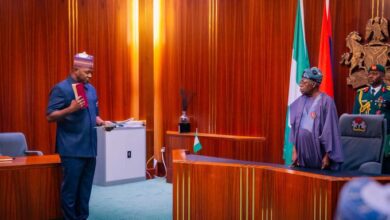Nigerian Import/Export Business: NCS Not Introducing e-Valuatuon, Invoicing Policy

The Nigerian Customs Service, NCS, has stated as incorrect, reports claiming it has aligned with the Central Bank of Nigeria, CBN, to introduce the e-valuatuon and e-invoicing policies for import and export businesses in Nigeria.
The refutation was made today, 24 March, 2022, in a statement made by the Service’s Public Relations Officer, DC Timi Bomodi.
TheFact Nigeria reports that the CBN had, on January 21 this year, introduced the policy requiring all import and export operations to submit an electronic invoice authenticated by the authorized dealer-banks on the Nigeria single window portal, Trade Monitoring System. The policy was to be effected February 1.
Flowing this, the House Joint Committees on Customs and Excise, Banking and Currencies, had asked the CBN to interface with the NCS to resolve grey areas on the planned implementation of the invoicing policy for the service.
The NCS in its earlier presentation by ACG Galadima Saidu, to the Joint Committee, expressed concerns that the implementation of the new policy by the CBN would adversely affect the Customs Service and the country’s economy, maintaining that the introduction of additional fees or charges and procedures through the e-valuator will affect Nigerian traders and the economy adversely.
However, on Monday, 21 March, reports made the rounds that, according to one of the national dailies, the CBN had received the backing of the NCS for its e-invoicing and e-valuation policy, which had led to protests from clearing agents and manufacturers.
Bomodi, in his statement, while refuting the report, reiterated that the Service “still stands by its earlier submission on the matter, as was earlier clearly communicated to the House of Representatives Joint Committee on Customs and Excise, Banking and Currencies on 3 March, 2022”.
According to him, the policy, which seeks to benchmark the price of imported and exported cargo, had raised objections from critical stakeholders within and outside the industry who have expressed valid concerns that require critical consideration.
He further clarified that the practice world over is to domicile adjudication on customs values for imports and exports within the Customs’ administration of every country, adding that the NCS “undoubtedly is alive to its statutory functions and has a vibrant Valuation Unit under the Tariff and Trade Department, whose role among others includes the proper interpretation of World Customs Organization, (WCO) and World Trade Organization (WTO) rules and agreements concerning the valuation of goods.
“Nigeria being a member of the WCO and WTO, and also a signatory to international trade treaties, including Article VII of the General Agreement on Tariffs and Trade, is contrained to abide by the principles contained therein”, Bomodi stated.
Bomodi also said that the Service, as a government agency aligns with the WTO Agreement on Customs Valuation (ACV), as it aims for a fair, uniform and neutral system for the valuation of goods for customs purposes.
“It is our view that the use of benchmarking in valuation as proposed by by the CBN policy will negate the sim of the ACV and result in disputes, delays and uncertainties.
“The WTO Trade Facilitation Agreement, TFA, remains the Service’s principle guide for trade facilitation. Therefore the NCS is always seeking new approaches to enable the expedited clearance of goods from our ports by adopting new technologies, harmonising and simplifying our procedures all of which are purposely designed to reduce cost”, the statement said.
Bomodi also intimated that the House of Representatives Joint Committee on Customs and Excise, Banking and Currencies, had directed that all agencies with defined roles in the supply chain meet to harmonise procedures, and resolve the issue of value for trade purposes. Because the meeting had yet to take place, there was no way any agreement supporting the CBN initiative could have been reached as reported in the news.
He said the Service was anticipating robust deliberations expected to take place whenever the meeting is held. “Until then, we shall continue to abide by the principles as contained in the ACV for all import/export transactions.”






